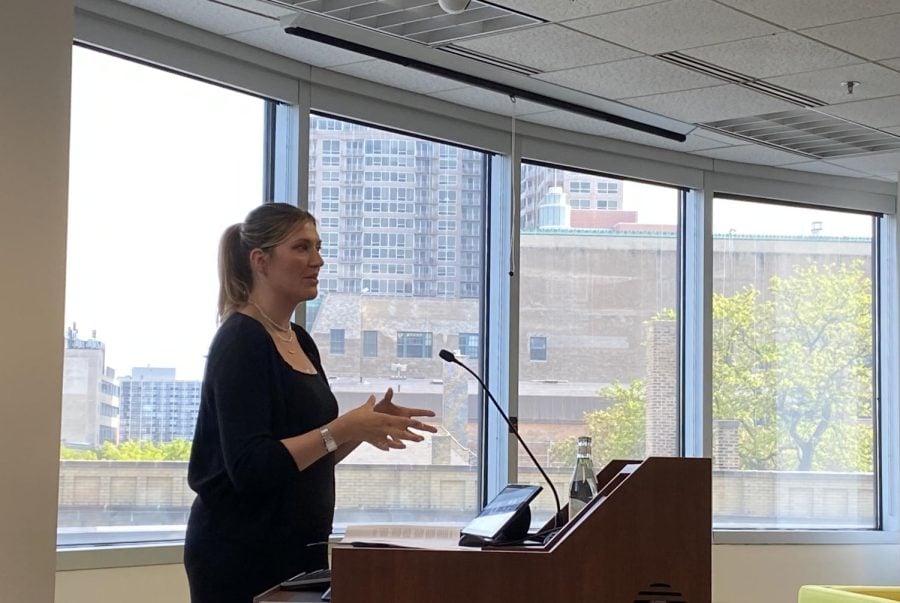Nobel Prize winner Beatrice Fihn discusses abolishing nuclear weapons in the age of the Ukraine war
Samantha Powers/The Daily Northwestern
In her talk, Fihn said the threat of nuclear conflict feels more present than ever in the era of the Russia-Ukraine war.
May 23, 2023
Beatrice Fihn, former executive director of the Nobel Peace Prize-winning International Campaign to Abolish Nuclear Weapons, gave a talk at Northwestern’s Buffett Institute for Global Affairs on Monday. She spoke on the heightened threat of nuclear war since Russia’s invasion of Ukraine and what the average citizen can do to combat the use of nuclear weapons.
Fihn said other methods of mass destruction, like biological warfare, have been delegitimized on a global scale — and she argued the same can be done for nuclear weapons through action from banks, businesses and citizens.
“This is something we can all do,” Fihn said. “Regular people can speak about the unspeakable, center humans in these conversations and expose the realities of these weapons.”
She said when talking about the destruction associated with nuclear warfare, it’s important to elevate communities that have been impacted the most.
Fihn said when wealthy countries practice nuclear testing, they often do so in impoverished and disempowered countries. Racism can come into play because some lives are seen as less valuable than others, she said.
Fihn added nuclear warfare is also a feminist issue, citing that women face disproportionate health impacts from nuclear fallout compared to men.
It’s important to highlight the human toll of nuclear warfare, she said.
“The supporters of these weapons of mass destruction hope to frame the issue of nuclear weapons … in abstract and sterile terms to avoid exposing what they are actually talking about,” Fihn said.
Fihn then detailed her work on passing the United Nations Treaty on the Prohibition of Nuclear Weapons, a global nuclear weapons ban that currently has 92 signatories. She noted that none of the nine countries that currently possess nuclear weapons have signed the treaty.
Chicago Ald. Maria Hadden (49th), who sponsored the Chicago City Council’s legislation urging President Biden to bring the country “Back from the Brink” on nuclear weapons, attended the talk. The resolution calls on the federal government to renounce the option of preemptive nuclear strikes, end the independent, unchecked power of the president to launch a nuclear attack and cancel plans to enhance the U.S. nuclear arsenal with new weapons.
Hadden said her constituents played a crucial role in her decision to champion the legislation. She said Chicagoans pay more than $500 million a year in federal taxes that go toward funding nuclear weapons — money that she said would be better spent on safe streets, education and public health.
Hadden added she involved the 49th Ward Youth Advisory Council in the process of passing this legislation, stressing the importance of highlighting young voices. When issues threaten the future of life on the planet, she said it’s important to work intergenerationally.
“When we talk about any long-term impact from government decision-making, we have to keep young people centered in our eyes,” Hadden said.
Fihn said now, in the era of Russia’s invasion of Ukraine, people can no longer ignore the threat of nuclear war.
Weinberg student Maelys Bory, a French exchange student, said she attended Monday’s talk because of her interest in political science. She said young people like her fellow NU students should have the chance to hear from speakers like Fihn on pressing global issues.
“I think the conflict (in Ukraine) shows the emergence of the issue in the sense that it can happen,” Bory said. “It’s not a mere risk, it’s not a small thing we can just live with and have in the back of our minds.”
Email: [email protected]
Twitter: @sqpowers04
Related Stories:
— Opinion | A lack of boundaries with a nuclear superpower is dangerous
— The Ripple: Evanston first city in Midwest to support denuclearization efforts
— City Council approves nationwide denuclearization resolution












